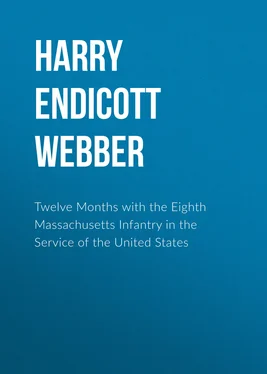Harry Endicott Webber - Twelve Months with the Eighth Massachusetts Infantry in the Service of the United States
Здесь есть возможность читать онлайн «Harry Endicott Webber - Twelve Months with the Eighth Massachusetts Infantry in the Service of the United States» — ознакомительный отрывок электронной книги совершенно бесплатно, а после прочтения отрывка купить полную версию. В некоторых случаях можно слушать аудио, скачать через торрент в формате fb2 и присутствует краткое содержание. Жанр: foreign_prose, История, foreign_edu, foreign_antique, на английском языке. Описание произведения, (предисловие) а так же отзывы посетителей доступны на портале библиотеки ЛибКат.
- Название:Twelve Months with the Eighth Massachusetts Infantry in the Service of the United States
- Автор:
- Жанр:
- Год:неизвестен
- ISBN:нет данных
- Рейтинг книги:5 / 5. Голосов: 1
-
Избранное:Добавить в избранное
- Отзывы:
-
Ваша оценка:
- 100
- 1
- 2
- 3
- 4
- 5
Twelve Months with the Eighth Massachusetts Infantry in the Service of the United States: краткое содержание, описание и аннотация
Предлагаем к чтению аннотацию, описание, краткое содержание или предисловие (зависит от того, что написал сам автор книги «Twelve Months with the Eighth Massachusetts Infantry in the Service of the United States»). Если вы не нашли необходимую информацию о книге — напишите в комментариях, мы постараемся отыскать её.
Twelve Months with the Eighth Massachusetts Infantry in the Service of the United States — читать онлайн ознакомительный отрывок
Ниже представлен текст книги, разбитый по страницам. Система сохранения места последней прочитанной страницы, позволяет с удобством читать онлайн бесплатно книгу «Twelve Months with the Eighth Massachusetts Infantry in the Service of the United States», без необходимости каждый раз заново искать на чём Вы остановились. Поставьте закладку, и сможете в любой момент перейти на страницу, на которой закончили чтение.
Интервал:
Закладка:
The Eighth Regiment was assigned to the Second Brigade, Third Division, First Army Corps. As Colonel William A. Pew, Jr. was the senior Colonel in the three regiments comprising this brigade, he was assigned to the command, pending the arrival of a Brigadier General, and the command of the Eighth Regiment devolved upon Lieutenant Colonel Edwin W. M. Bailey. Colonel Pew remained in command of the Brigade until June 29th, when he was succeeded by General Waites of Texas. Lieutenant Thomas D. Barroll, the Regimental Adjutant, and Lieutenant Charles F. Wonson, the Regimental Quartermaster, were detailed to Brigade Headquarters, and acted respectively as Adjutant General and Brigade Quartermaster. Their places in the regiment were filled by the detail of Lieutenant George W. Langdon, Acting Regimental Adjutant, and Lieutenant George I. Canfield, Acting Regimental Quartermaster, while Lieutenant Augustus G. Reynolds acted as Regimental Commissary.
The Third Division of the First Army Corps encamped on the Alexander Bridge road, near the southeastern corner of the Park, and about three miles from the railroad station. The camp of the Eighth was located in the woods, which were not dense, but more than sufficient for shade purposes. The tents of the Commanding Officer and his staff faced the west. Fifty paces in front of Headquarters were the tents of the line officers, and fifty paces in front of the quarters of the line officers were the heads of the Company streets. The tents of the men faced south, and were five paces apart. The Company streets were thirty paces wide. Thirty paces from the last tent in the Company street were the Company kitchens, and fifty paces in rear of the kitchens, were the Company sinks. The Eighth had the longest camp front of any Regiment in the Park, and later when sickness began to appear in the various camps, the wisdom of this arrangement was apparent.
Until May 23rd, when wagons and mules were issued to the Regiment, water was scarce. Every farm well in the vicinity was under guard, and had a line of details waiting for a turn at the pump handle. The wells were pumped dry many times daily. The details remained in line waiting for them to fill up. Chickamauga Creek was already contaminated by drainage, and long expeditions were made to obtain enough water for drinking and cooking purposes.
With the issuing of transportation, water was hauled for all purposes from the Blue Spring, some five miles from camp, until the Government constructed a pipe line and brought water to the vicinity of every camp. This pipe line water was never used in the Regiment for drinking, and during the whole stay of the Regiment at Chickamauga, all drinking water was daily brought from the Blue Spring.
The lack of water led to the circulation of many absurd rumors at home. It was reported that the wells had been poisoned by the Spanish spies, and that some had been detected in the act and shot. The water famine was much exaggerated in the reports from Chickamauga. The regiment undoubtedly suffered much inconvenience at first, but not greater than should have been expected from the hurried manner in which the troops were brought together.
For some time the army mule was a source of entertainment and worry to the regiment. The Government issued to each regiment twenty-seven wagons and one hundred and eight mules. Previous to this issue, these mules were assembled in a large corral near the railroad station. Usually, a detail of four men was sent to draw a wagon, four mules and harnesses. The mules were turned over to this detail, together with various parts of harnesses and a wagon, as they came from the factory. It was the duty of the detail to hold the mules and at the same time assemble harnesses and wagon. This was new work for most of the men, and the outfits were brought into camp after many sad experiences. It was not unusual for the detail to start from the corral driving in a careful manner, but after going a mile or two without mishap, the desire to speed a little overcame this caution, and the mules were urged to a trot or canter. As few of these animals had been broken, the first turn of a road presented an opportunity for a spill.
There was such a turn near the camp of the Eighth, and many of the men used to sit under the trees watching the details from other regiments navigate their mules around the bend. Often mules would continue on a straight course into the woods, and bid up when some tree separated the leaders and threw them down, with the wheel mules and wagon piled on top. This performance was at first a daily occurrence, and apparently resulted in no injury to the mules or men.
Another source of amusement was to hire the darkies who loafed about the camps, to break the mules. They were usually ridden bare back, and succeeded in throwing their riders several times before they would submit.
The mule quarters at first consisted of a cable stretched from tree to tree, to which the mules were fastened by halters. This was the practice in all the camps, and every night each regiment lost from ten to twelve mules. The mules usually wandered around the park until appropriated by some Quartermaster to make up his quota.
After submitting for a few nights to this loss, Lieutenant Colonel Bailey determined to construct a corral of rails, and for this purposes obtained permission to use the top rails of various fences along the Alexander road. This work of construction took place on a moonlight night, and in the morning it was discovered that the rail fences for a long distance had disappeared, and a large area in the camp of the Eighth was surrounded with a Virginia fence some 12 feet high. The detail charged with the work of construction stoutly maintained, when explanation was demanded, that none of them had taken anything but "top rails". With this improvised stable the Quartermaster of the Eighth was able to maintain his supply of mules.
There were two entrances to this corral at which sentinels were maintained, with orders to allow any stray mules to go in, but none to come out. Every morning an extra surplus of mules was found in the corral.
The wagon master, who was a civilian employee, and had been hired by the Quartermaster on account of his experience with mules, soon had his pick of all the mules in the Park. His first duty in the morning was a readjustment of mule property. Any surplus was held and delivered to inquiring Quartermasters who had lost mules. As all mules look alike to most Quartermasters, it came to pass in the course of time, that the wagon master of the Eighth had by far the best mule teams of any Regiment. It was, in fact, a selection from the mules of fifty odd regiments.
Apparently no one suspected this process of eliminating poor mules, and the corral of the Eighth was looked upon as a public benefaction, where lost mules could usually be found and identified. The process of identification was directed and controlled by the experienced wagon master of the Eighth.
During May the evenings were delightfully cool in contrast with the heat of the day. Work finished, with parade and after supper, the men collected in groups to sing, listen to the drum corps, or gossip about the future of the regiment. Rumors of immediate moves were always in circulation. It was generally believed that the First Corps was destined to invest Havana in the fall, but this belief was often shaken by rumors of orders to go to Manila, Honolulu, Santiago, or Porto Rico. The regiment was always expecting marching orders in the immediate future.
Almost every large congregation contains some men who need a free application of soap and water. In a camp where many men are herded together, the personal cleanliness of each soldier is a factor in the general health.
As soon as the pipe line was established, and water was abundant, orders were issued in regard to bathing, and were enforced by weekly inspections. The men were required to strip in quarters, and were examined by the surgeons. The first inspection disclosed an unfortunate who had secreted on his person, a liberal amount of Georgia real estate.
Читать дальшеИнтервал:
Закладка:
Похожие книги на «Twelve Months with the Eighth Massachusetts Infantry in the Service of the United States»
Представляем Вашему вниманию похожие книги на «Twelve Months with the Eighth Massachusetts Infantry in the Service of the United States» списком для выбора. Мы отобрали схожую по названию и смыслу литературу в надежде предоставить читателям больше вариантов отыскать новые, интересные, ещё непрочитанные произведения.
Обсуждение, отзывы о книге «Twelve Months with the Eighth Massachusetts Infantry in the Service of the United States» и просто собственные мнения читателей. Оставьте ваши комментарии, напишите, что Вы думаете о произведении, его смысле или главных героях. Укажите что конкретно понравилось, а что нет, и почему Вы так считаете.












